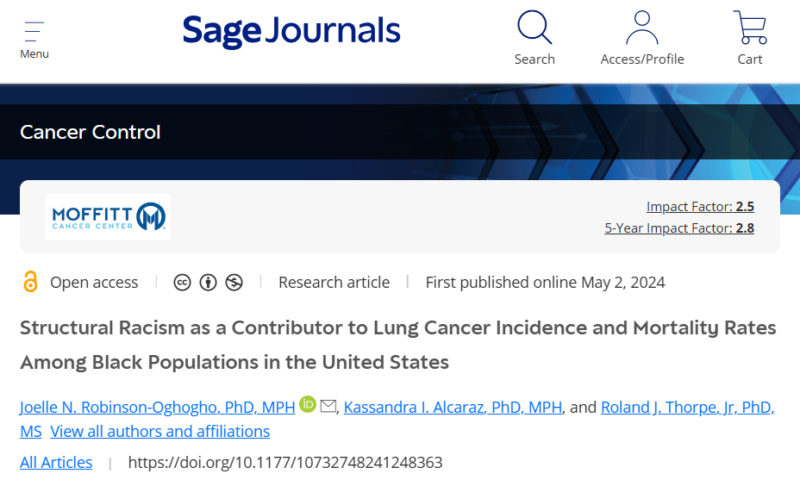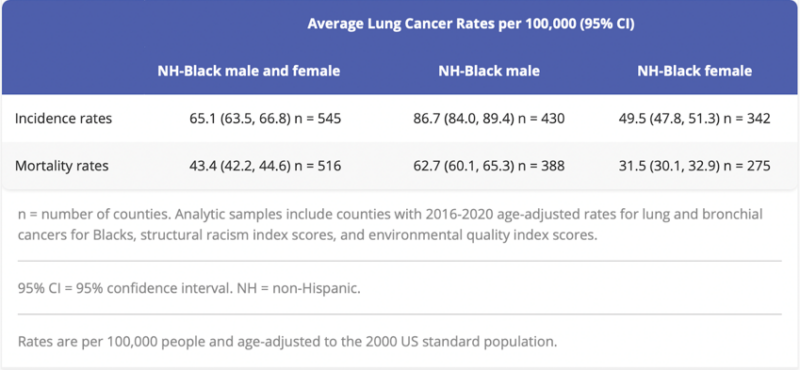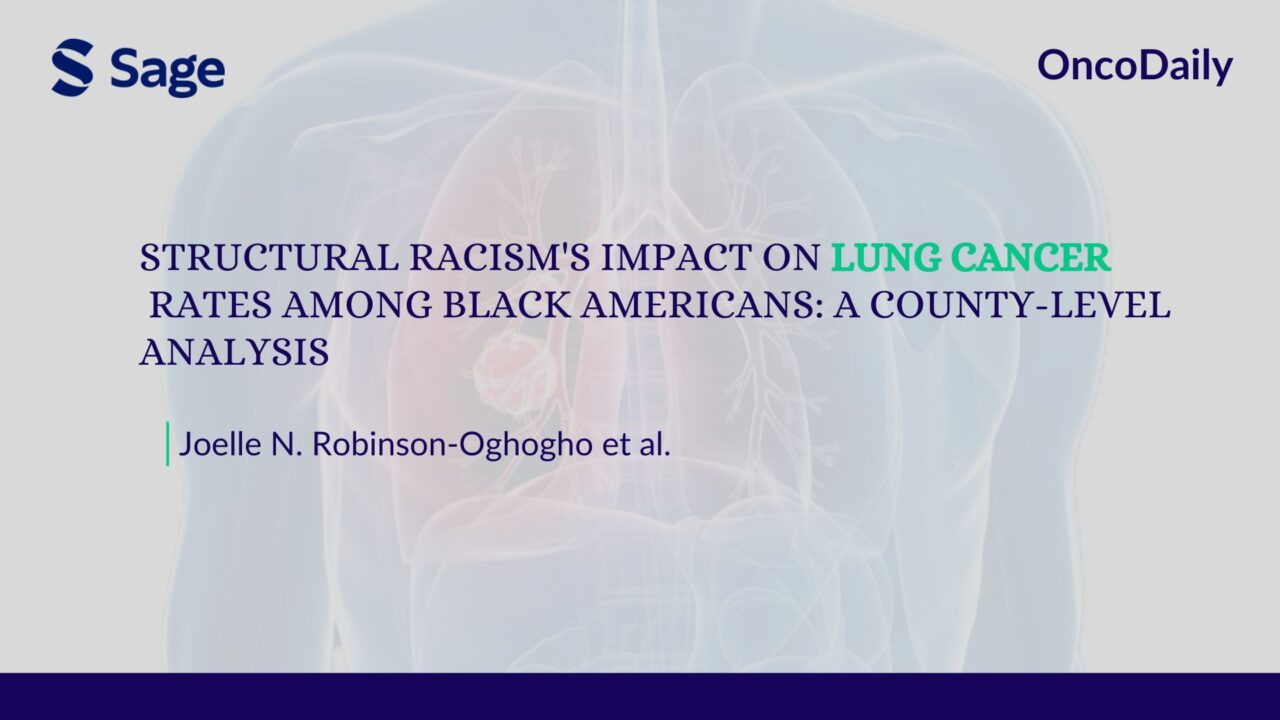Structural Racism’s Impact on Lung Cancer Rates Among Black Americans: A County-Level Analysis
Authors: Joelle N. Robinson-Oghogho, Kassandra I. Alcaraz, Roland J. Thorpe

Published in Cancer Control, Sage Journals on May 2024
Introduction
Despite recent reductions in racial disparities, lung cancer remains the second most diagnosed cancer among Black Americans. This study examines how structural racism, a root cause of health inequities, contributes to lung cancer incidence and mortality rates in Black populations across U.S. counties. By using a multidimensional measure of structural racism and accounting for environmental quality, the researchers aimed to quantify this relationship and provide insights for targeted interventions.

Above is presented 2016-2020 Average US County-Level Lung Cancer Incidence and Mortality Rates for Non-Hispanic Black Populations.
Design/Methods
The study employed an ecological design, analyzing county-level data from 2016-2020. Key data sources included:
- United States Cancer Statistics Data Visualization Tool for lung cancer incidence and mortality rates
- A pre-existing county-level structural racism index
- Environmental Protection Agency’s 2006-2010 Environmental Quality Index (EQI)
- 2023 County Health Rankings
- 2021 United States Census American Community Survey
The researchers conducted multivariable linear regressions to examine associations between county-level structural racism scores and lung cancer incidence and mortality rates among Black populations. They controlled for environmental quality domains, adult smoking rates, healthcare access, rurality, and geographic mobility.
What We Learned
- Structural racism is positively associated with lung cancer incidence and mortality rates among Black populations, even after controlling for environmental factors and other covariates.
- For every standard deviation increase in county-level structural racism score:
- Lung cancer incidence rates increased by 6.4 cases per 100,000 for Black males and females combined
- Lung cancer mortality rates increased by 3.3 deaths per 100,000 for Black males and females combined
- The association between structural racism and lung cancer rates was stronger for Black males compared to Black females:
- Incidence rates increased by 8.1 cases per 100,000 for Black males vs. 5.1 cases for Black females
- Mortality rates increased by 5.1 deaths per 100,000 for Black males vs. 3.8 deaths for Black females
- Environmental quality, particularly sociodemographic characteristics, also showed significant associations with lung cancer rates. However, structural racism remained a significant factor even after accounting for these environmental variables.
- The average county-level lung cancer incidence rate for Black populations was 64.7 new cases per 100,000, with Black males (86.7 per 100,000) having a markedly higher rate than Black females (49.5 per 100,000).
- Mortality rates followed a similar pattern, with Black males experiencing 62.7 deaths per 100,000, nearly twice the rate of Black females at 31.5 deaths per 100,000.
Key Highlights
- The study provides evidence that structural racism contributes to both new lung cancer cases and deaths among Black populations, particularly among Black males.
- The research emphasizes the importance of addressing racism as a root cause when developing strategies to reduce lung cancer disparities.
- The multidimensional structural racism index used in this study captures race-based differences across multiple social determinants of health, providing a more comprehensive assessment than single-dimension measures like residential segregation.
- The study’s ecological design, while having limitations, offers a valid and representative way to examine macro-level exposures (structural racism) on population-level outcomes.
- The analysis included counties representing about half of the total U.S. population, enhancing the generalizability of the findings.
Key Takeaway Messages
- Structural racism is a significant contributor to lung cancer disparities, highlighting the need for interventions that address systemic inequalities in addition to individual risk factors.
- Public health efforts to reduce lung cancer incidence and mortality should consider targeting the systems comprising structural racism, including housing, incarceration, employment, economic, and educational disparities.
- The stronger association between structural racism and lung cancer outcomes among Black males suggests a need for tailored interventions that address the unique challenges faced by this population.
- Future research should explore how various systems of oppression intersect and reinforce inequalities across gender and throughout the life course.
- Developing and refining measures of structural racism can help elucidate its mechanisms and identify potential areas for intervention in cancer control efforts.
- A multidisciplinary approach is needed to address the complex ways in which structural racism impacts health outcomes, requiring collaboration across various fields of study and practice.
- While individual-level interventions remain important, this study underscores the critical need for systemic changes to effectively reduce racial disparities in lung cancer outcomes.
In conclusion, this study provides compelling evidence for the role of structural racism in perpetuating lung cancer disparities among Black Americans. By quantifying this relationship at the county level, the research offers valuable insights for policymakers, healthcare providers, and public health professionals working to reduce the burden of lung cancer in marginalised communities. Future efforts to address cancer disparities should consider how various systems uphold racial inequities and work towards dismantling these structures to promote health equity.
Quote from the Editor
“Structural racism contributes to increased lung cancer incidence and deaths among Black Americans, with this association being stronger for Black males. Interventions targeting structural racism are needed in order to bridge lung cancer incidence and outcome disparities. Cancer Control remains committed in reporting disparities in cancer diagnosis, treatment, and outcomes, advocating equity in cancer care for all”


